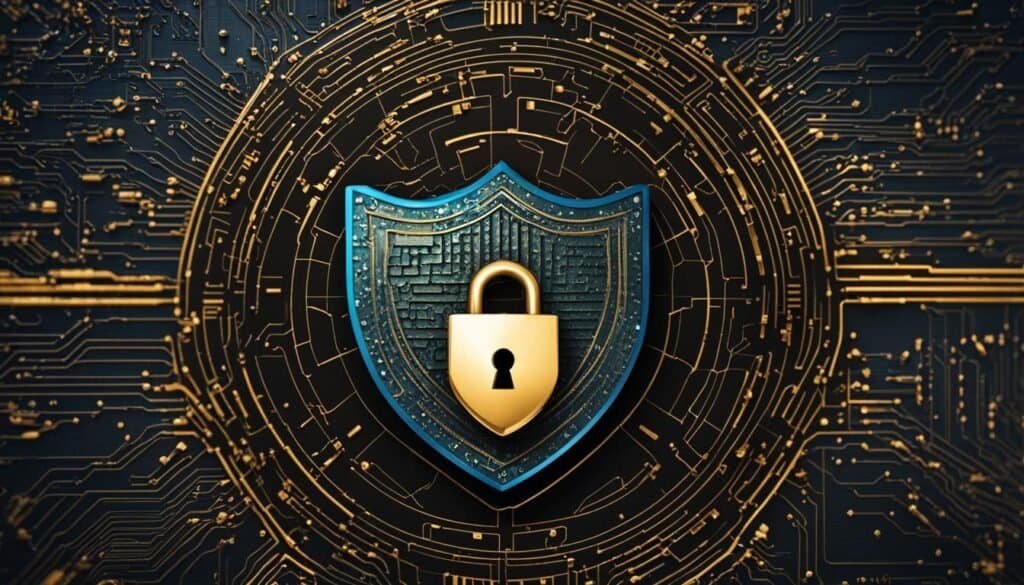In today’s hyperconnected world, our digital lives are more intertwined with our daily routines than ever before. From online shopping and social media to online banking and remote work, we rely heavily on the internet for various aspects of our lives. However, this increased connectivity also exposes us to a growing number of cyber threats. In this section, we’ll explore the basics of cyber threats and the impact they can have on our digital world.
Key Takeaways:
- Hacking has the potential to significantly impact our digital world.
- Cyber threats pose risks to individuals, organizations, and even nation-states.
- Understanding the power of hacking is crucial to protect ourselves online.
- Implementing cybersecurity measures can reduce the risk of falling victim to hacking attempts.
- Protecting our digital world is a shared responsibility.
Types of Cyber Threats: Understanding the Capabilities of Hacking
In today’s digital landscape, cyber threats are a constant concern for individuals, organizations, and governments alike. The world of hacking is vast, with various types of cyber threats that can cause significant harm. Understanding these types of threats is crucial in order to protect ourselves and our digital assets.
1. Malware: Malicious software, such as viruses, worms, and ransomware, that is designed to infiltrate and damage computer systems.
2. Phishing: A type of social engineering attack where scammers deceive individuals into revealing sensitive information, such as passwords or credit card details, by masquerading as trustworthy entities.
3. Social Engineering: Manipulating individuals into providing sensitive information or granting unauthorized access through psychological coercion or deception.
4. Hacking: Unauthorized access or manipulation of computer systems or networks to gain control, steal data, or cause damage.
5. Distributed Denial of Service (DDoS): Overwhelming a target system with massive amounts of traffic, rendering it unable to function properly.
6. Insider Threats: Malicious activities carried out by individuals within an organization who have authorized access to sensitive information or systems.
The Potential of Hacking
“Hacking has become a powerful tool in the hands of skilled individuals or groups with harmful intent. From stealing personal information to disrupting critical infrastructure, hackers can cause significant damage.”
The consequences of hacking can be devastating. It can lead to financial losses, compromised personal information, and even national security threats. Hackers can exploit vulnerabilities in computer systems, networks, and even IoT devices. They can gain unauthorized access, steal sensitive data, manipulate information, or even shut down essential services. The potential of hacking extends beyond individual targets and can impact entire industries and societies.
It is essential for individuals and organizations to stay vigilant and take proactive measures to protect against these cyber threats. Implementing robust cybersecurity practices, staying informed about emerging threats, and investing in cutting-edge security solutions can help mitigate the risks of hacking. By understanding the capabilities of hacking and the potential consequences it carries, we can work together to build a more secure digital world.
| Type of Threat | Description |
|---|---|
| Malware | Malicious software designed to infiltrate and damage computer systems. |
| Phishing | Social engineering attack where scammers deceive individuals into revealing sensitive information. |
| Social Engineering | Manipulating individuals into providing sensitive information or granting unauthorized access. |
| Hacking | Unauthorized access or manipulation of computer systems or networks. |
| Distributed Denial of Service (DDoS) | Overwhelming a target system with massive amounts of traffic, causing it to malfunction. |
| Insider Threats | Malicious activities carried out by individuals within an organization with authorized access. |
By understanding the capabilities and potential consequences of hacking, we can take the necessary steps to protect ourselves and our digital assets. Stay informed, stay vigilant, and prioritize cybersecurity in our increasingly interconnected world.
Protecting Your Digital World: Essential Steps for Cybersecurity

In today’s hyperconnected world, it is crucial to prioritize the protection of our digital lives. With cyber threats becoming more sophisticated, it is essential to take proactive measures to safeguard our online presence. By following these cybersecurity tips, we can significantly reduce the risk of falling victim to hacking attempts and ensure our digital world remains secure.
Using Strong and Unique Passwords
One of the simplest yet most effective ways to protect your digital world is by using strong and unique passwords for all your online accounts. Avoid using easily guessable passwords such as “123456” or “password.” Instead, create complex passwords that include a combination of letters, numbers, and special characters. Additionally, ensure that you use different passwords for each account to minimize the impact of a potential breach.
Enabling Two-Factor Authentication
Two-factor authentication (2FA) adds an extra layer of security to your online accounts. By enabling 2FA, you will be required to provide a second form of verification, such as a unique code sent to your mobile device, in addition to your password. This significantly decreases the chances of unauthorized access, even if your password is compromised.
Keeping Software Updated
Software updates often contain critical security patches that address vulnerabilities. It is important to regularly update all the software on your devices, including operating systems, web browsers, and applications. Set up automatic updates whenever possible to ensure you are always running the latest, most secure versions.
| Actions | |
|---|---|
| 1 | Use strong and unique passwords for all accounts |
| 2 | Enable two-factor authentication |
| 3 | Regularly update software |
| 4 | Be cautious of phishing attempts |
| 5 | Educate yourself and others about cyber threats |
| 6 | Use reputable security software |
| 7 | Secure your Wi-Fi network |
| 8 | Regularly back up your data |
| 9 | Be cautious on social media |
| 10 | Secure your mobile devices |
| 11 | Stay informed about security news |
| 12 | Report suspicious activity |
By implementing these essential steps for cybersecurity, we can protect our digital world and decrease the likelihood of falling victim to hacking attempts. Remember, safeguarding our online presence is a shared responsibility, and it starts with each of us taking proactive measures to stay secure in today’s ever-evolving threat landscape.
The Power of Hacking: Understanding the Consequences
Hacking has become a powerful tool in the digital age, with the potential to unleash a wide range of consequences. Hackers, driven by various motives, can cause significant harm to individuals, organizations, and even governments. Understanding the impact of hacking is crucial in order to protect ourselves and our digital world from its devastating effects.
The consequences of hacking can be far-reaching. From a financial perspective, hacking can lead to substantial losses, both for individuals who fall victim to identity theft and for businesses that suffer from data breaches. Additionally, the compromises in data security can have a lasting impact on an individual’s personal and professional life. The power of hacking lies in its ability to disrupt our daily lives and undermine the trust we place in our digital systems.
“The power of hacking lies in its ability to disrupt our daily lives and undermine the trust we place in our digital systems.”
On a larger scale, hacking can have severe implications for national security. State-sponsored hacking can target critical infrastructure, such as power grids or transportation systems, with potentially catastrophic consequences. Furthermore, hackers can engage in corporate espionage or cyber espionage, stealing valuable intellectual property or sensitive government information. The consequences of such actions not only impact individual companies but can also have significant geopolitical ramifications.
The Impact of Hacking
The impact of hacking goes beyond financial losses and compromised security. It can erode public trust in digital systems and hinder technological advancements. When individuals and organizations fear the consequences of hacking, they may become hesitant to fully engage in the digital world, limiting the potential for innovation and collaboration. As a society, we must recognize the power of hacking and work together to develop robust cybersecurity measures that protect us from its consequences.
| Consequences of Hacking | Examples |
|---|---|
| Financial Losses | Identity theft, data breaches |
| Compromised Security | Personal and professional data at risk |
| Disruption of Daily Lives | Loss of trust in digital systems, disruption of online services |
| Threat to National Security | State-sponsored hacking, infrastructure disruption |
| Geopolitical Ramifications | Cyber espionage, theft of intellectual property |
As individuals, we can play our part in mitigating the consequences of hacking by practicing good cybersecurity habits, such as using strong and unique passwords, being cautious of suspicious emails or links, and keeping our devices and software updated. It is essential to remain vigilant and stay informed about emerging threats in order to protect ourselves and contribute to a more secure digital future.
The Importance of Cybersecurity: Building a Secure Digital Future

In today’s increasingly interconnected world, the importance of cybersecurity cannot be overstated. As we rely more and more on digital technologies for various aspects of our lives, the need to protect our online presence becomes paramount. Cybersecurity is not solely an individual responsibility; it is a shared responsibility that requires collaboration between individuals, organizations, and governments.
By understanding the potential risks and taking proactive measures to protect our digital lives, we can contribute to building a more secure and resilient digital future. This means implementing strong and unique passwords, enabling two-factor authentication, and keeping our software and devices up to date. Additionally, being cautious of phishing attempts, securing our Wi-Fi networks, and regularly backing up our data are essential practices for maintaining a secure online presence.
Organizations and governments also play crucial roles in safeguarding our digital world. They must invest in robust cybersecurity measures, regulations, and standards to ensure the integrity and privacy of our digital infrastructure. By collaborating with individuals and providing education and resources, they can empower individuals to take charge of their cybersecurity and contribute to a safer digital ecosystem.
Building a secure digital future requires constant vigilance and a commitment to staying informed about emerging threats. By staying up to date with the latest news and best practices in cybersecurity, we can adapt our strategies and defenses accordingly. Together, we can create a digital world that fosters trust, innovation, and prosperity for everyone.
Key Takeaways:
- Cybersecurity is a shared responsibility that involves collaboration between individuals, organizations, and governments.
- Individuals can protect their digital lives by implementing strong passwords, enabling two-factor authentication, and staying vigilant against phishing attempts.
- Organizations and governments must invest in robust cybersecurity measures and provide education and resources to empower individuals.
- Staying informed about emerging threats and best practices is crucial for building a secure digital future.
Conclusion: Safeguarding Our Digital World
In today’s interconnected world, safeguarding our digital world is of utmost importance. As we have explored in this article, cyber threats pose significant risks to our online presence and can have detrimental consequences for individuals and society as a whole. However, by understanding the basics of cybersecurity and implementing best practices, we can strengthen our defenses and protect ourselves from hacking attempts.
Securing our online presence is a shared responsibility that requires the collaboration of individuals, organizations, and governments. By taking proactive measures such as using strong passwords, staying informed about emerging threats, and practicing good cybersecurity habits, we can contribute to a safer and more resilient digital ecosystem.
Remember, protecting our digital world is an ongoing process. It requires vigilance and a commitment to staying informed about the ever-evolving landscape of cyber threats. By prioritizing cybersecurity and encouraging others to do the same, we can build a more secure digital future for everyone.
So let’s take the necessary steps to safeguard our digital world. Together, we can create a safer online environment and enjoy the benefits of our hyperconnected world without falling victim to hacking attempts. Stay informed, stay proactive, and secure your online presence for a brighter digital future.
How Can We Stay Safe Online and Protect Ourselves from Hacking?
Ensuring hack money impact online safety is minimized requires proper measures. Frequent password changes, avoiding suspicious links and downloads, and using two-factor authentication can shield us from hacking incidents. Staying vigilant and educating ourselves about phishing scams and malware are crucial for online security. Additionally, keeping our devices updated and using reliable antivirus software further strengthens our defense against cyber threats.
FAQ
What are cyber threats?
Cyber threats encompass a broad range of malicious activities carried out by individuals or groups with harmful intent. These threats can include malware, phishing, social engineering, hacking, distributed denial of service (DDoS), and insider threats.
How can I safeguard my digital world from cyber threats?
To protect your digital world, it is important to follow certain steps. These include using strong and unique passwords, enabling two-factor authentication, keeping software updated, being cautious of phishing attempts, educating yourself and others about cyber threats, using reputable security software, securing your Wi-Fi network, regularly backing up your data, being cautious on social media, securing your mobile devices, staying informed about security news, and reporting suspicious activity.
What are the potential consequences of hacking?
Hacking can have various consequences, ranging from financial losses and identity theft to compromised national security and infrastructure disruptions. It is crucial to understand the power that hacking holds and the potential impact it can have on individuals and society as a whole.
Who is responsible for cybersecurity?
Cybersecurity is a shared responsibility. While organizations and governments play crucial roles in securing the digital world, individuals also have a vital role to play in practicing good cybersecurity habits. By taking proactive measures and staying informed about emerging threats, individuals contribute to a more secure and resilient digital ecosystem.
What is the importance of cybersecurity?
Cybersecurity is essential for building a secure digital future. By protecting our digital world, we can safeguard our online presence, prevent financial losses and identity theft, and ensure the integrity of our systems and infrastructure. It requires collaboration between individuals, organizations, and governments to create a safer digital environment.




0 Comments